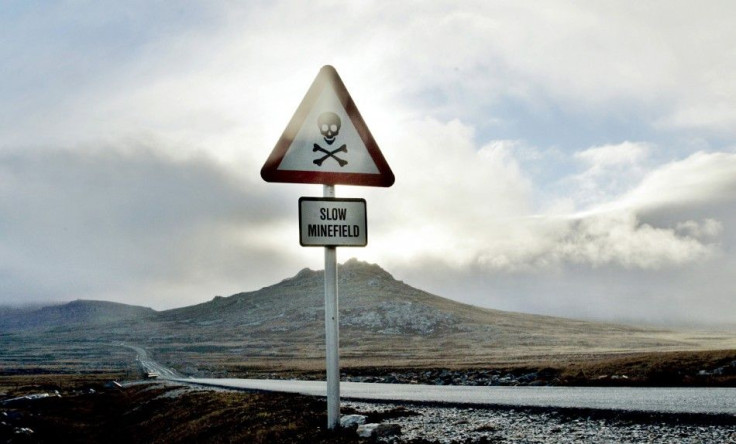Falkland Islands Dispute: Argentina Denies Entry to Two Cruise Ships

Two Carnival Corp. cruise ships carrying nearly 3,000 passengers were refused entry at an Argentine port because they had previously visited the Falkland Islands and bared British flags.
A decades-old dispute between Argentina and the United Kingdom has put the remote Falkland Islands, which the Argentines call the Malvinas, back in the news just in time for the 30th anniversary of the Falkland Islands War.
For many, it seems like déjà vu. Some blame the new Meryl Streep movie about Margaret Thatcher coming out in time for the anniversary of the 74-day scuffle. Others claim it's the posting of the heir to the British throne and his air force helicopter and the deployment of the world's most advanced new warship and nuclear missile submarine to the cold South Atlantic waters.
Those who follow Argentine politics say it has to do with pre-election opinion poll numbers for President Cristina Fernandez de Kirchner. Perhaps the biggest reason it's on both nation's minds is a recent Edison Investment Research study suggesting that Britain could receive billions of dollars from oil recovered around the English-speaking UK Overseas Territory.
The argument heated up on Monday when both the Adonia and the Star Princess arrived off Tierra Del Fuego on Argentina's southern tip, but were prevented from docking in Ushuaia by provincial Argentine authorities.
Both ships are operated by Carnival Corp. and had reportedly just visited the Falkland Islands.
We are very concerned to hear the Adonia and Star Princess have been refused access to the port of Ushuaia, a spokesman for Britain's Foreign Office said. There can be no justification for interference in free and legitimate commerce.
British diplomats in Argentina are urgently seeking to clarify the circumstances surrounding this incident, and we are in contact with the company concerned.
Monday is a public holiday in Argentina and no official comment has been made about the incident. The Associated Press reports that veterans of Argentina's brief war with Britain persuaded Gov. Fabiana Rios to enforce a provincial law passed last August that bans British vessels, ships partly owned by British companies, and ships flying flags from British territories from docking in Argentina.
However local tourism officials argued that the law was meant to cut off Argentine support for offshore oil and gas exploration in the islands and was never meant to apply to cruise ships, which are vital to the remote city's economy.
Adonia is on an 87-night tour of South America that departed from Southampton while the Bermuda-flagged Star Princess is on a 14-night trip from Rio de Janeiro. The two ships are reportedly headed to Punta Arenas in Chile.
Tensions between Argentina and the UK have run high for over a month. Kirchner lodged an official complaint with United Nations Secretary-General Ban Ki-moon three weeks ago over the UK's decision to send nuclear weapons to the Falkland Islands in defiance of a treaty that seeks to establish a nuclear-free zone in the South Atlantic.
Britain argues that its sovereignty over the islands predates the existence of the state of Argentina and it will endure so long as the islanders wish to remain British.
The Falkland Islands are situated in the South Atlantic some 400 miles east of the South American mainland and 850 miles north of the Antarctic Circle. East and West Falkland have a landmass comparable to that of Connecticut and are home to fewer than 3,000 islanders.
With nearly 500,000 sheep in the Falklands, there are roughly 163 sheep per person. There are also more than 500,000 breeding pairs of penguins camped out along the rugged coast.
The Falkland Islands remain an agricultural society that is heavily dependent on tourism. Grumblings of further dispute between the two nations are troublesome for the Islands' welcoming image.
The majority of visitors come to the islands in the summer peak season between October and April, when the weather is more favorable for wildlife viewing.
Precipitous cliffs, ancient volcanic remains, and wide open vistas dot the landscape - though it does have its scars.
Ironically, seaside minefields from the war have become favorite breeding grounds for penguins. The animals don't weigh enough to detonate the mines, so the fields have become protected, human-free sanctuaries that are popular eco-tourism destinations.
READ ALSO: Falkland Islands: A Look at the Disputed Territory [PHOTOS]
© Copyright IBTimes 2024. All rights reserved.






















